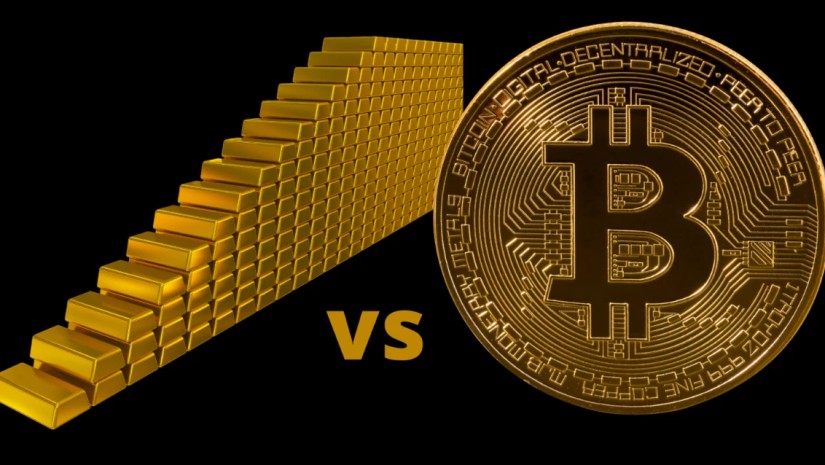Gold has been accepted as safe money as conventional wisdom for generations while bitcoin is and can still be a philosophical & emotional debate. It is interesting to note that many well educated and financed trained people still have little to zero understanding of bitcoin as money or as an asset class.
Only in 2017, gold and bitcoin were roughly one to one in the sense that gold and bitcoin could be bought or exchanged at USD 1,000 levels. At the end of April 2024, both gold and bitcoin trade at All-time record highs against the USD. Gold above 2,000 and bitcoin above 60,000 US dollars.
The debate of whether bitcoin is an asset class or a store of value is now most probably behind us as BlackRock has launched iShares bitcoin ETF and the global free markets tells you that bitcoin is trading above USD 60,000 in the currency of the world’s reserve currency, the US dollar.
Gold has been money for 6,000 years or at least since human stupidity was still more powerful than artificial intelligence.
Bitcoin emerged as a form of digital currency in 2009 when it was introduced by an anonymous person or group using the pseudonym Satoshi Nakamoto. Its creation marked the beginning of Bitcoin's existence as a form of money. Or money without a government. Similar to like most LAW is about the STATE, most currencies are tied to a nation STATE or political construct.
Gold and bitcoin are currencies that are not tied to any nation state or ruling political party. Your bitcoin is not anyone else’s liability or debt.
Diversification is the only free lunch in finance and or the global financial markets as opined by Harry Markowitz, the Nobel Prize-winning economist renowned for his work on portfolio theory, which emphasizes the importance of diversification in reducing total portfolio investment risk.
Investors who have gold in their portfolio might want to consider to add and have Bitcoin as part of strategic asset allocation
Younger and more tech savvy clients who often considered gold to be an investment for old people and "barbarous relic" to paraphrase British economist and founder of the world bank, Lord Maynard Keynes. gold for tech savvy investors at times was considered a useless pet rock that cannot be emailed. Yet true diversification benefits of adding gold to their strategic asset allocation and retirement portfolios has validity.
Diversification helps mitigate the impact of individual investment losses by spreading risk across a range of assets, thereby providing a "free lunch" in terms of risk reduction without sacrificing potential returns.
While Bitcoin's journey toward being recognized as money is ongoing and its status as a mainstream currency is still debated it very much complements traditional portfolios based on 60 -40 asset allocation.
Gold has been a trusted investment for centuries. It's recognized as a safe haven in times of economic crisis and is widely considered a hedge against inflation.
Gold's value is not tied to any governmental or economic system. In fact, when financial turmoil causes stock prices to drop and currency to weaken, gold prices often increase, making it a great way to protect your portfolio from losses.
Despite its benefits, gold does have downsides. While it generates steady returns, these returns are typically modest, making gold better for wealth preservation than wealth generation. You shouldn't keep more than 5% to 10% of your portfolio in gold so you have room for other assets, such as stocks, to create bigger returns.
In addition, if you choose to invest in physical gold, you must store is securely and insure it, which adds to your costs.
Gold and Bitcoin are both considered alternative investments and stores of value, but they have several key differences:
Physical vs. Digital: Gold is a physical commodity, meaning it exists in the physical world as a tangible asset. Bitcoin, on the other hand, is a purely digital currency that exists only in the form of code on a decentralized network of computers.
Supply: Gold has a finite supply on Earth, and new gold is mined at a relatively steady rate. Bitcoin, on the other hand, has a fixed supply cap of 21 million coins, making it deflationary by design. This means that as time goes on and more coins are mined, it becomes increasingly difficult to obtain new bitcoins.
Portability: Bitcoin is highly portable since it exists in a digital format and can be transferred instantly over the internet. Gold, while valuable, is physically bulky and requires secure storage facilities.
Divisibility: Bitcoin is divisible up to eight decimal places, allowing for extremely small transactions. Gold, however, is not easily divisible, and smaller units like grams or ounces may not be practical for everyday transactions.
Store of Value: Both gold and Bitcoin are often considered stores of value, meaning they are perceived as assets that can retain their worth over time. Gold has a long history as a store of value, while Bitcoin's store of value proposition is more recent but has gained traction due to its scarcity and decentralized nature.
Volatility: Bitcoin tends to be much more volatile than gold. Its price can fluctuate dramatically over short periods, making it a riskier investment compared to gold, which typically experiences more stable price movements.
Regulation: Gold is a heavily regulated asset, with laws governing its mining, trading, and storage varying from country to country. Bitcoin, being a decentralized digital currency, operates outside the traditional regulatory frameworks of most governments, though there are increasing efforts to regulate it in various jurisdictions.
while both gold and Bitcoin have their merits as alternative investments and stores of value, they have significant differences in terms of physicality, supply, portability, divisibility, volatility, and regulatory environment.
because of all these important factors, a combination of gold and bitcoin as part of alternatives further diversifies client and investment portfolios.
Rainer Michael Preiss, Partner & Portfolio Strategist at Das Family Office in Singapore
















